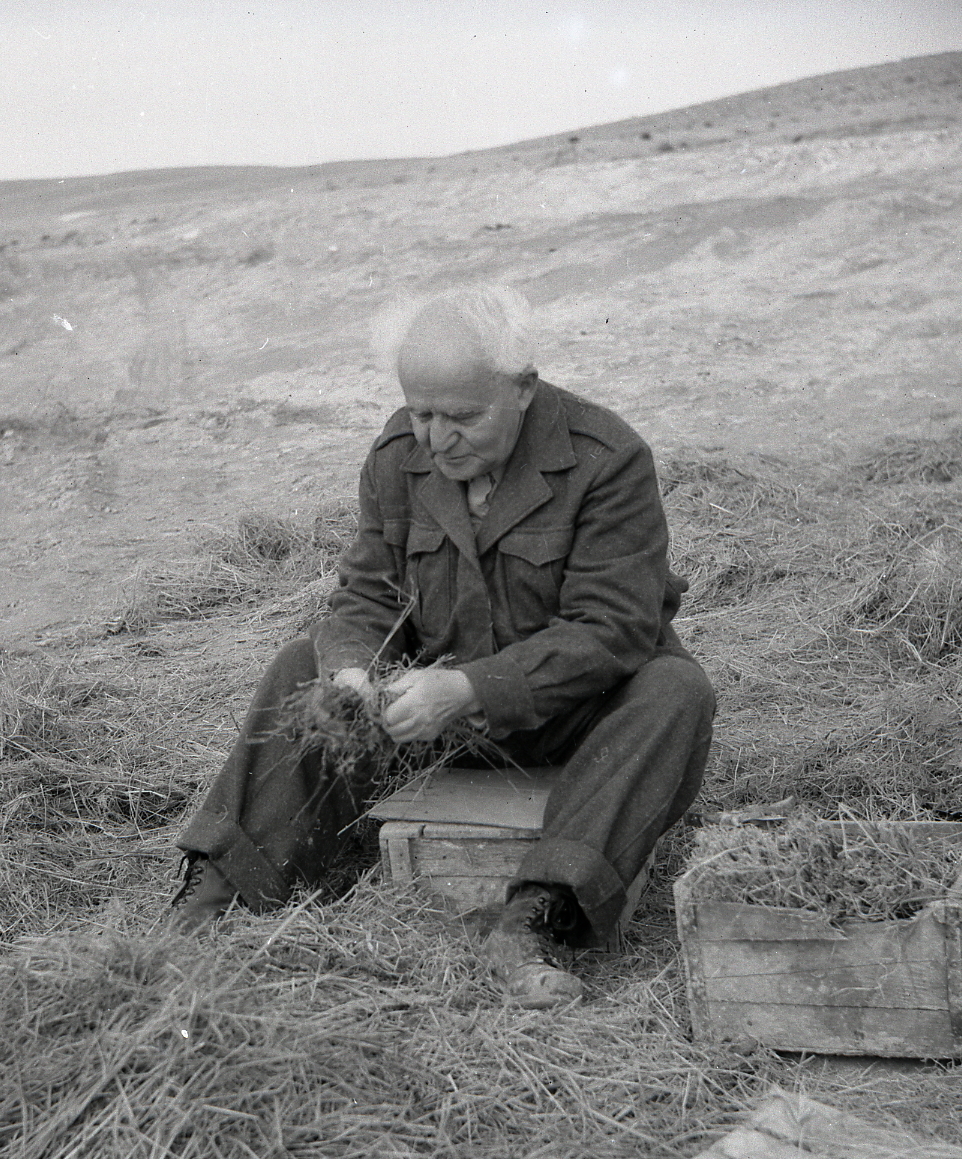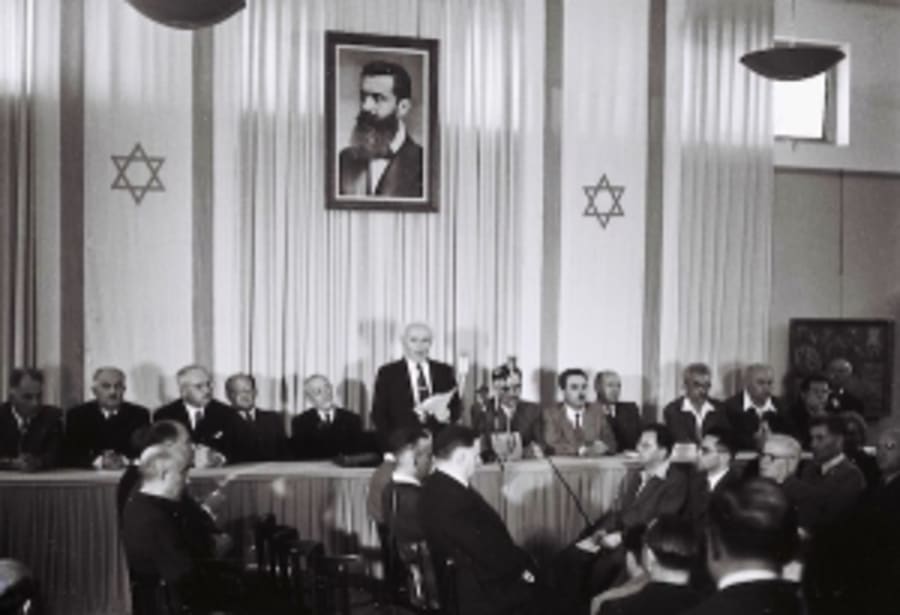The country's first prime minister: David Ben-Gurion – Israel's Washington and Jefferson in one figure
Ben-Gurion’s leadership came at a critical time in the nation’s history

Who was David Ben-Gurion, and how did he come to be the country’s first prime minister?
David Ben-Gurion was born David Grün on Oct. 16, 1886, in Płońsk, Poland. (In 1886, Płońsk was part of the Russian Empire.)
Twenty years later, in 1906, he immigrated to the land of Israel when it was still under Ottoman rule. In his own words, he came “for the positive purpose of rebuilding a homeland.”
He arrived at Jaffa port, and moved to Petah Tikvah, before spending time wandering from Jewish settlement to Jewish settlement. He also worked at the wineries set up by Jewish immigrants in Rishon Lezion and Kfar Saba.
After several years, he moved to Jerusalem in 1910, where he became one of the editors for a socialist newspaper called “Ha’achdut” – meaning “unity”.
During this time, he adopted the last name Ben-Gurion, following the historical character Joseph Ben-Gurion, mentioned as a leader in the Great Jewish Revolt in 66-70 A.D.
After two years, Ben-Gurion and his friend and co-editor, Yitzhak Ben Zvi, traveled to Istanbul, in modern-day Turkey, to study law at Kushta University, hoping to represent Zionist interests to the Ottoman leaders.
With the outbreak of World War I, the two were expelled from Israel by the Ottomans for their Zionist activities, and they moved first to Alexandria, Egypt, before settling in New York City, where they founded “The Pioneer” movement.
In 1917, Ben-Gurion married Paula Munweiss, with whom he had three children.
The next year, Ben-Gurion and Ben Zvi organized a group of Hebrew battalions for the British army and returned with them to Israel.
Ben-Gurion became very active in the Labor movement and the Zionist movement in Israel and continued to work to bring Jews to settle in the British-controlled territory. He became chairman of the Jewish Agency.
He worked against the British interests of limiting Jewish settlement following the publication of the “White Paper,” which prohibited further Jewish settlement in British Mandatory Palestine.
During World War II, Ben-Gurion, along with Dr. Chaim Weizmann, started the Biltmore Conference, the first general American Zionist conference.
Following the war, Ben-Gurion increased his Zionist activities, especially after visiting the Bergen-Belsen concentration camp and seeing the need for a Jewish homeland where Jews could defend themselves.
In November 1947, Ben-Gurion accepted the announcement of the United Nations General Assembly Resolution 181, calling for the partition of former Mandatory Palestine into two states; a Jewish state and an Arab state.
The partition plan was accepted by Jewish groups in the land, while the Arab leaders rejected the plan.
Arab attacks against Jews started almost immediately, while various Jewish groups also responded with violent attacks of their own.
The British government, which was preparing to remove its forces from Mandatory Palestine, as the partition plan also ended its mandate to govern there, did little to stop the fighting between the two groups.
Israel declared its independence on May 14, 1948, after the British withdrawal from the land.
Similar to Thomas Jefferson, who authored the U.S. Declaration of Independence when American colonies proclaimed their separation from British rule on July 4, 1776, Ben-Gurion played an instrumental role in establishing the State of Israel. Ben-Gurion both drafted and was the first to sign Israel's Declaration of Independence, making his reading of the document on May 14 a landmark event. This moment, preserved in audio and video, along with his leadership, underscores Ben-Gurion's enduring legacy as a founding father of the Jewish nation.

As the War of Independence had already begun with the invasions of various Arab armies into the country, the fledgling nation needed a leader, and Ben-Gurion served as both the interim prime minister and defense minister.
In both positions, one of his primary achievements was uniting the various Jewish militias into one unified military force, the Israel Defense Forces (IDF).
Ben-Gurion served as prime minister until 1954, when he resigned from the position, as well as his leading role in the Ministry of Defense.
In 1955, he was re-elected to the position of prime minister, serving until 1963, when he again resigned from the office.
David Ben-Gurion is a political giant in Israel’s history, and in many ways is as much a figure of legend as the U.S. founding father George Washington.
The comparison to Washington goes beyond the mere fact they were their respective countries' first leaders. Ben-Gurion, while not a great general like Washington, did play a significant role in forming the IDF by serving as defense minister for many years.

Ben-Gurion’s leadership came at a critical time in the nation’s history, and his commitment to the Zionist cause from its early beginnings made him the ideal figure to unite the various Zionist groups, many of whom were in conflict against each other before the Arab invasion in 1948.
The Israeli historical leader is also responsible for many of the decisions that have affected national politics until today. He is considered responsible for the status quo agreement with the Orthodox Agudat Israel party, which determined the framework for many religious matters in Israel up to the present.
As part of the agreement, he committed to establishing a non-theocratic state that would respect many core Jewish practices, such as Sabbath observance, Kosher kitchens in government-funded institutions, and the allowance for rabbinic yeshivot (schools for teaching Talmudic studies) to be considered equal to secular state schools.
While not religious himself, Ben-Gurion understood the importance of the Jewish religion for the nation, especially the emotional attachment of the Jewish people to the Land of Israel. He often quoted biblical passages and spoke respectfully about the role of religion during his public speeches.
At the same time, Ben-Gurion worked to maintain a strong secular basis for law and government, which has prevailed until today.
He remained a strong Zionist his entire life, choosing to retire in the Negev with the hope of inspiring a generation to "make the desert bloom."
Ben-Gurion died on Dec. 1, 1973, following a cerebral hemorrhage. He was buried next to his wife Paula in Sde Boker, the kibbutz he helped found in the Negev.
Today, both of his homes – one in Tel Aviv and one in Sde Boker – have been turned into museums where the public can learn about the life of one of modern Israel’s founding fathers.


J. Micah Hancock is a current Master’s student at the Hebrew University, pursuing a degree in Jewish History. Previously, he studied Biblical studies and journalism in his B.A. in the United States. He joined All Israel News as a reporter in 2022, and currently lives near Jerusalem with his wife and children.
You might also like to read this:














